
- Courtesy
- Major Jackson
Acclaimed poet and South Burlington resident Major Jackson, an English professor at the University of Vermont, has been selected as co-editor of the 2019 edition of The Best American Poetry. Yes, non-poetry peeps: that is a BFD. The anthology, published by Simon & Schuster, is slated for release on September 10 — the day after Jackson’s 51st birthday.
The recipient of a Pushcart Prize and a Whiting Award, Jackson is the author of four volumes of poetry. Two of his books, Hoops and Holding Company, were finalists for the NAACP Image Award. His debut collection, Leaving Saturn, won the Cave Canem Poetry Prize for a first book of poems and was a finalist for the National Book Critics Circle Award.
Jackson's poems and essays have appeared in The American Poetry Review, Callaloo, the New Yorker, the New York Times Book Review, the Paris Review, Ploughshares and Tin House, as well as several volumes of The Best American Poetry.
In addition to teaching at UVM, Jackson serves as poetry editor of the Harvard Review.
On the occasion of this career milestone, Seven Days emailed with Jackson about what it means to be tasked with curating the best American poetry of the year.
SEVEN DAYS: Being featured in a Best American Poetry anthology can be a career maker for a poet. What does it mean to be selected as an editor?
MAJOR JACKSON: Depending on how you look at it, I guess it means I either care greatly about the wondrous power of words, especially metaphorical language, and have convinced enough people as an editor, teacher and writer that poetry is one of the most remarkable evidence and testimony of our sacred existence, survival and curiosity (because the material of the art is primarily human speech), or it means I have wasted my life writing and reading a mountain of poems across the ages by men and women long forgotten and can begin to gauge poetry’s progress against those written today.
In the face of such a task, I am humbled by the entrusted responsibility to bear witness to poetry’s vitality and to report my awe. Needless to say, editing The Best American Poetry 2019 is a tremendous honor, especially when I roll-call those who [have] taken on the task before me. And, although I bat away such canonizing gestures out of genuine modesty, I guess it also recognizes my distinct contributions to the art, minimal albeit.
SD: What have been the challenges of selecting works for inclusion?
MJ: Previous editors have discussed the awesome variety of English-language poetry written today. I find that the diversity of styles, subject matter and approaches of poems to be true and confirming of the richness of humanity, but [that] itself is a challenge. How does one begin to identify authenticity and greatness among a garden, colorfully vibrant, each flower praiseworthy in and of itself?
I stressed on the possibility of having missed a poem that would enrich a potential reader’s experience of life and language, so I sacrificed my eyes to reading as much as humanly possible over a year. Poems have the possibility of changing lives, of truly making a difference, and although that’s a tall order for any work of art, nonetheless the possibility exists, and I was driven by that match-making.
Curating this anthology required me to not only be open to the fertile grounds by which poets toil to give artful expression to their lives and selfhood, but to consider, in this age of divisiveness, how a bridge might be made between us, how a poem can mediate what is unfathomable and mysterious about existence and how we understand or treat each other.
SD: How do you, personally, define "the best American poetry" in this current moment, in 2019?
MJ: Terrific you qualified the question by indicating the year — indeed, what we value today could become meretricious and tawdry tomorrow. The measures by which we gauge excellence in any art always shift.
I was drawn to poems that risk human connection, poems that reach toward language as consolation in the face of so much that is designed to alienate us from each other and nature. Isn’t it ironic that in an age of technology and screens meant to render us “global,” we are even more isolated from each other and the environment — particularly if we measure our bonds through a 21st-century political lens?
I eventually found 75 poems that stabilized our shared fate as humans, poems that seemed relevant in their irrelevance, poems that celebrated our curiosity about each other and our past, but also seem to actively resist platitudes of thinking and language.
Correction, June 3, 2019: An earlier version of this story misidentified one of Jackson's current roles.
Speaking of...
-

Book Review: 'Razzle Dazzle,' Major Jackson
Feb 28, 2024 -

What Louise Glück Wanted 'Was to Be Understood'
Dec 20, 2023 -

Hancock's Whiskey Tit Press Publishes Books No One Else Will
Dec 20, 2023 -

The Latest Issue of '05401' Honors the Architects, Idols and Thinkers Who Shaped Its Eclectic Publisher
Nov 22, 2023 -

Former Vermont Poet Laureate and Nobel Prize Winner Louise Glück Dies at 80
Oct 13, 2023 - More »










Comments
Comments are closed.
From 2014-2020, Seven Days allowed readers to comment on all stories posted on our website. While we've appreciated the suggestions and insights, right now Seven Days is prioritizing our core mission — producing high-quality, responsible local journalism — over moderating online debates between readers.
To criticize, correct or praise our reporting, please send us a letter to the editor or send us a tip. We’ll check it out and report the results.
Online comments may return when we have better tech tools for managing them. Thanks for reading.